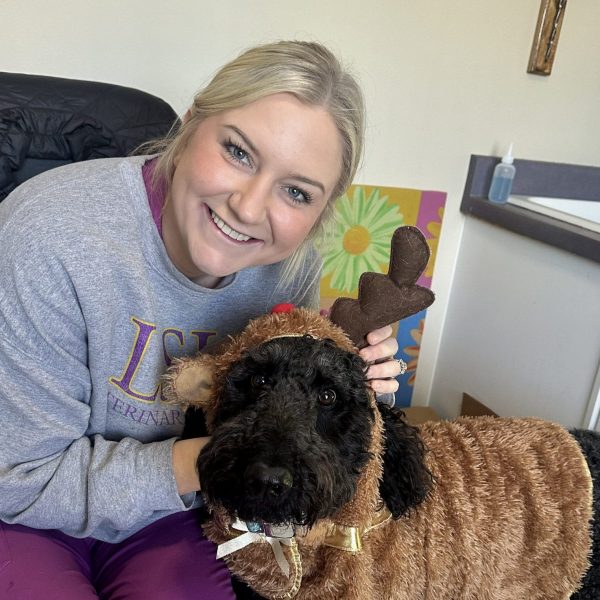We’re feeling a little celebratory this month 🎉—one year ago, The Furry Godmother launched its Vet Spotlight series with Dr. Jennifer Purcell of the newly opened Eastern Shore Pet Hospital in Fairhope. This month, we celebrate both milestones, featuring more insights from Eastern Shore Pet Hospital! Dr. Purcell turns the spotlight on fourth-year veterinary student Zoe Vicich, who is completing her externship at ESPH, to discuss Leptospirosis, a significant concern this time of year.
Have you ever heard of Leptospirosis, more commonly known as Lepto?
Lepto is a potentially dangerous disease that can affect you and your pets. Dogs will have a variety of clinical signs and cats rarely have any signs of infection. Lepto is a disease that can be spread from our pets to us, most commonly through exposure to contaminated body fluids such as urine. In people the disease can cause flu like symptoms to death.
Lepto can be found in stagnant or slow-moving water. It can survive in a moist environment for months. For our pets, they most commonly encounter lepto from the rodents and squirrels. Lepto is excreted in the urine and can contaminate puddles and streams. Infections most commonly occur in June to November as there is heavy rainfall and increased populations of small wildlife. Infections are most common in the Midwest and Southeast.
Lepto commonly affects the kidneys and the liver. It can also affect the blood’s ability to clot. In dogs, there is a range of different symptoms that occur. Some animals can be fairly asymptomatic with subtle signs such as increased thirst, weight loss, decreased appetite, and vomiting. In more severe cases symptoms may include fever, muscle tenderness, lethargy, blood in the feces or urine, bruising, or jaundice. The more severe cases can even lead to death. Rarely cats will have increased thirst and urination, lameness, fever, or GI upset. Lepto can be a difficult disease to diagnose as it often has vague symptoms that may go unnoticed in the beginning stages of disease.
Treatment is available and often includes an antibiotic such as doxycycline or a penicillin. Supportive care in the form of fluids, electrolytes, and diuretics are needed for the kidneys. Gi support may also be needed in the form of anti-nausea medications and medications to protect the GI tract. Nutrition is also an important part of recovery, and some patients may require feeding tubes. In cases where the blood is impacted plasma or blood transfusions may be needed to prevent bleeding. The prognosis for cats is typically good. In dogs the survival rate is more variable and often requires aggressive treatment early in the disease process.
Outdoor cats are more predisposed to infection as they have more exposure to small rodents. For dogs working breeds are often more predisposed, but any breed can be affected. We often see our small breed dogs that live in more urban areas are commonly affected. Exposure to wildlife and livestock are also a risk factor for dogs. Puppies often have more severe disease than adult dogs.
There are preventative measures that can be performed to decrease the risk of infection for our pets. A vaccine is available for our dogs. In the past this vaccine has been based on risk factors but has recently become considered as a core vaccine for most dogs. The vaccine is initially started during puppy vaccines around 12 weeks old and requires a booster. Following the puppy vaccines the vaccine is administered annually. Another preventative measure involves environmental management. Environmental management includes limiting exposure to rodents and small wildlife and eliminating stagnant water which can act as a reservoir for the bacteria.
As we approach the rainy season when lepto is more common, it is important that we take precautions to prevent our pets from being infected. Vaccination is an important aspect to decreasing your pets’ risk of infection. I feel that leptospirosis is an under discussed disease and that educating pet parents on this disease could decrease the occurrence of disease and allow diagnosis earlier.
Zoe Vicich – Eastern Shore Pet Hospital
Big thanks to Zoe Vicich, Dr. Jennifer Purcell, and Eastern Shore Pet Hospital for their ongoing efforts to unite our local pet owner community through education and support! We celebrate Dr. Purcell’s successful first year at Eastern Shore Pet Hospital, as many of you do!
Visit ESPH here: Eastern Shore Pet Hospital
We hope you’re finding the spotlight articles useful, and we are eternally thankful for you, our Furry Godmother family. 🧚♂️






